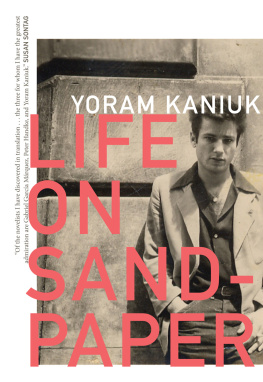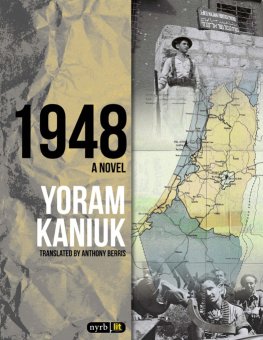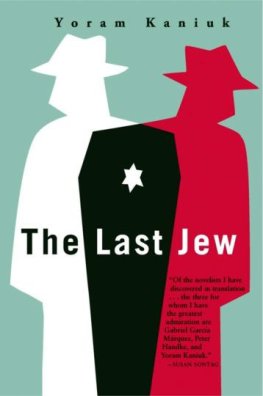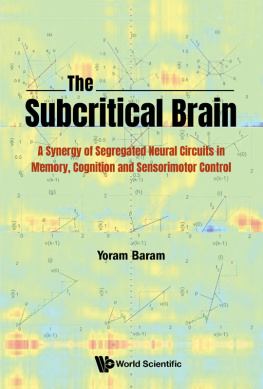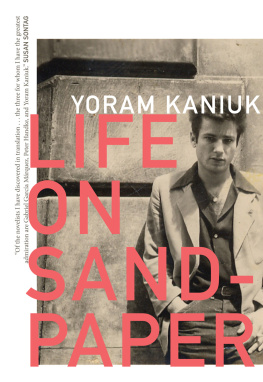Yoram Kaniuk - Life on Sandpaper
Here you can read online Yoram Kaniuk - Life on Sandpaper full text of the book (entire story) in english for free. Download pdf and epub, get meaning, cover and reviews about this ebook. year: 2003, publisher: Dalkey Archive Press, genre: Non-fiction. Description of the work, (preface) as well as reviews are available. Best literature library LitArk.com created for fans of good reading and offers a wide selection of genres:
Romance novel
Science fiction
Adventure
Detective
Science
History
Home and family
Prose
Art
Politics
Computer
Non-fiction
Religion
Business
Children
Humor
Choose a favorite category and find really read worthwhile books. Enjoy immersion in the world of imagination, feel the emotions of the characters or learn something new for yourself, make an fascinating discovery.
- Book:Life on Sandpaper
- Author:
- Publisher:Dalkey Archive Press
- Genre:
- Year:2003
- Rating:5 / 5
- Favourites:Add to favourites
- Your mark:
- 100
- 1
- 2
- 3
- 4
- 5
Life on Sandpaper: summary, description and annotation
We offer to read an annotation, description, summary or preface (depends on what the author of the book "Life on Sandpaper" wrote himself). If you haven't found the necessary information about the book — write in the comments, we will try to find it.
Yoram Kaniuk: author's other books
Who wrote Life on Sandpaper? Find out the surname, the name of the author of the book and a list of all author's works by series.
Life on Sandpaper — read online for free the complete book (whole text) full work
Below is the text of the book, divided by pages. System saving the place of the last page read, allows you to conveniently read the book "Life on Sandpaper" online for free, without having to search again every time where you left off. Put a bookmark, and you can go to the page where you finished reading at any time.
Font size:
Interval:
Bookmark:
Dolly City
Orly Castel-Bloom
Homesick
Eshkol Nevo
TRANSLATED BY ANTHONY BERRIS
Series Editor: Rachel S. Harris

DALKEY ARCHIVE PRESS
CHAMPAIGN AND LONDON
Originally published in Hebrew as Chaim Al Neiar Zchuchit by Yedioth Aharonoth, Tel Aviv, 2003
Copyright 2003 by Yoram Kaniuk
Published by arrangement with the Institute for the Translation of Hebrew Literature
All rights reserved
Library of Congress Cataloging-in-Publication Data
Kaniuk, Yoram.
[Hayim al neyar zekhukhit. English]
Life on sandpaper / Yoram Kaniuk; translated by Anthony Berris. -- 1st ed.
p. cm.
ISBN: 978-1-56478-613-5
1. Kaniuk, Yoram. 2. Authors, Israeli--Biography. I. Berris, Anthony. II. Title.
PJ5054.K326H2313 2011
892.436--dc22
[B]
2010038344
Partially funded by the University of Illinois at Urbana-Champaign and by a grant from the Illinois Arts Council, a state agency

The Hebrew Literature Series is published in collaboration with the Institute for the Translation of Hebrew Literature and sponsored by the Office of Cultural Affairs, Consulate General of Israel in New York
The publication of this book was sponsored by the Oded Halahmy Foundation for the Arts, Inc.
www.dalkeyarchive.com
Cover: design by Danielle Dutton
Dedicated to
Lee Becker (Kaniuk) Theodore
Gabriel Solomon (Gandy) Brodie
Charlie (Bird) Parker
Alfred Thornton Baker III
It isnt entirely incorrect to call this book a work of fiction, despite its being an account of my memories from a certain period of my life, and despite the fact that many of its characters might also appear in history books concerning those same years.
As Aristotle said, It is not the function of the poet to relate what has happened, but what may happenwhat is possible. The poet and the historian differ [in that] one relates what has happened, the other what may happen.
There had been a war and I was wounded. When I got back I was remote and detached from everything, didnt speak for days and would draw on the walls because Id killed people before Id kissed a girl. We were drinking at Caf Piltz with Menashke Baharav who played The Battle in the Negev Plains and I went out to the old boardwalk by the sea. I stood there and sensed a living thing nearby. A pungent, sweet fragrance. And I sneaked a look and there was a womans silhouette. We moved toward one another gradually. Finally, without a word, we kissed. My leg was in a cast and I dragged myself along with her up the London Garden to the Excelsior, a so-called hotel for soldiers. We went up to the room where there was a narrow single bed and a few rotting apples. In the window was the sea. And a full moon. She shouted in German and kissed my boot thinking I was a Gestapo agent. She was oh-so-good and showed me what to do. In the morning we looked at one another. We couldnt just ask whats your name, whats yours. We stood on Ben-Yehuda Street eating pretzels and she looked at me lovingly and I at her, and I didnt know what to say and started walking north from Bugrashov Street toward my parents house and the street filled up with carts, buses, bicycles, a few cars. I realized then that I wanted her, and she watched me, pained, from afar, turned around and walked away, defeated in my new country. I recalled the tang of distant places that came from her, her clothes that gave off a foreign fragrance. I tried to follow her but I was limping and she vanished into the morning noise, her eyes withdrawn. I loved a girl whod previously been another mans girlfriend and had stopped loving him before hed managed to die but was obliged to sit with his family, mourning as if she was still his girl. We used to slip away to the park to be together. She felt guilty and ended up leaving me, but then fell in love with a friend of mine.
It takes a lot of nerve to bang your head against the wall. These are the things I leave behind. Simcha begat Sarah, Joseph, and Alexander. Mordechai begat Moshe and Bluma. His great-grandmother, a Jewish queen, rode naked on a horse through the town so that salvation would come. In 1970, H. said: Dannys dead, Bills dead, once again our generation is starting to die. Sarah, my mother, said at the old cemetery, when she went to visit her friends, that she remembered how, in May 1921, theyd brought Brenner and his comrades to the high-school building. They had been torn apart, mutilated, there were twenty-two of them. She said: I covered their disfigured bodies with sheets. They were buried together since it was impossible to tell who was who. Forgive me that this is my legacy to you.
I worked on an immigrant ship and was made fun of when I went to the museum in Naples instead of to 69, the best brothel in town. Outside they were selling little girls for ten cigarettes each. A young woman holding a little girl by the hand said: My sister. Clean. Shaved. Young. I gave her some change and went to the museum. The young woman prayed to the Madonna, behind whom a barefooted priest whod collect horse manure for heating had placed an oil lamp, so that it would look like the image was weeping. In the museum they had the Pompeian Frescoes. I was hungry. A thin man with a huge pot tied to his belly was selling spaghetti. I asked for some. With or without, he asked. With, I replied. He pulled two bottles from his pockets, took a swig from each, gargled the mixture in his mouth, and sprayed it onto the spaghetti. I walked a short distance so he wouldnt see and threw the stuff away. Hordes of children sprang up and devoured it, even the newspaper wrapping. I took an antiquated taxi to my friends at 69, who laughed: A socialist has come to the heart of capitalist decadence. There was a naked woman there spinning around on a piano stool, and made-up girls for sale sat around making faces. A friend brought over a gaunt, frightened girl. This one, he said, has only been here since Tuesday. I took her and bought her some trinkets shed been staring at in a shop window and then some shoes and a coat. The dollar was worth at least five hundred lira and we felt rich. I took her to a restaurant in Santa Lucia, one of the dozens of empty restaurants waiting for customers who never came. I fed her. She ate like a tigress. The waiters with their stained sleeves made chewing motions and I invited them to eat too. The chef came over and I invited him and his assistant as well. And also the owner, who sat like a commanding officer supervising everything, and they were all scared of him, but he was hungry too, so I asked him to join us. We drank wine. Mount Vesuvius gleamed in the light coming from some ship. I took her for a walk. She said, My name is Angelina, and asked for shoelaces. I bought them for her. She tied them together into a long string that she then tied to my wrist and said, Im your dog, dont leave me. The immigrants were already on board. We launched the Pan York and Angelina cried at the port. Grandmother died. Grandfathers and grandmothers died. My parents, Moshe and Sarah, died. Friends died. A year in Jerusalem on the roof of an old monastery school. A huge tree in the courtyard. They said that St. Hieronymus once sat under it.
Then came a year in Paris. We painted. Caf Le Dme. A few affairs and the story with Flora. Why, of all things, was it the movie version of Guys and Dolls , which I saw in May 2002 in a building thats a year older than me on Bilu Street, and in which they sing Luck Be a Lady Tonight, why was it that particular movie that triggered this book, this journey. At the opening of my first exhibition in 1952 at the Feigel Gallery on Fifty-seventh Street, New York, New York, a woman named Beulah I didnt know then but with whom I later became very close bought a painting. I was thrilled because Id made two hundred dollars. I realized that if Id sold one painting at the opening Id sell many more over the two weeks of the exhibition. At the end of the evening there were ten of us left, maybe more. We were drunk on the sweet wine that Feigel, whod discovered Kokoschka in Prague, had served the guests. I invited them all to a Lebanese restaurant that was usually almost empty. The owner, Anton, would come to the table, recommend things from the menu, take our orders, write them down meticulously, stand at the hatch in the kitchen wall, shout out the entire order, go into the kitchen, prepare the food, call out all the orders from the kitchen, then come out, take the tray hed placed on the window ledge from inside, serve, and quietly go back inside to wash the dishes and, before his customers left, wipe the table. After wed eaten I bought everybody tickets to Guys and Dolls , which was then ending its Broadway run after many years. I spent all the money Id received for the painting. Life as a musical: funny, human, illusory, and at eleven-thirty at night we walked to Forty-second Street where there was a movie theater that screened comedies. There were convex mirrors in the foyer that distorted everyone who walked in. We were drinking from a bottle of bourbon that Cyril Johnson, the drummer, had bought. There was a huge Wurlitzer there, spitting sparks and with revolving arrows at the top, making exploding sounds and laughing horribly, and Cyril told it, Im from Mars, whats a nice girl like you doing in a place like this? I dont remember which movie we saw, two movies actually, and I cant remember the second one either. It was cold and started snowing. We went home. Not that we really had homes. We sang Luck Be a Lady Tonight and then I made it to bed with or without someone but I cant remember that bit either.
Font size:
Interval:
Bookmark:
Similar books «Life on Sandpaper»
Look at similar books to Life on Sandpaper. We have selected literature similar in name and meaning in the hope of providing readers with more options to find new, interesting, not yet read works.
Discussion, reviews of the book Life on Sandpaper and just readers' own opinions. Leave your comments, write what you think about the work, its meaning or the main characters. Specify what exactly you liked and what you didn't like, and why you think so.

